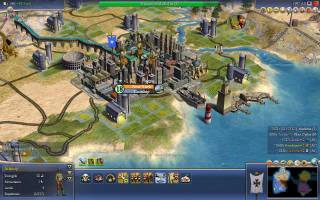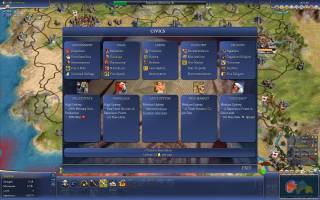Gaming Memories: Civilization IV
By majormitch 7 Comments
Welcome to “Gaming Memories,” a blog series where I reminisce about my favorite video games. I will slowly but surely get to every game on the list, and speak to why each holds a special place in my heart. That not only means I’ll talk about why I think each is a great game that speaks to my tastes, but also where and how it affected me in a larger context. I hope you enjoy, and thanks for reading.
In one of my first games of Sid Meier’s Civilization IV, my citizens were constantly unhappy. My cities were too crowded, they were working too hard, they wanted more luxuries, and I guess they didn’t like that we went to war that one time (the other guy started it, I swear). I did everything I could to appease them, because I needed them to harvest crops to feed our people, build structures of science and art and faith, construct inspiring wonders, and produce profitable goods; all to keep our civilization thriving and healthy. But no matter how many colosseums and theaters I built, they were still unhappy. It was then that I questioned my choices as a leader.

Civilization is, at its core, a game that constantly presents you with choices. Meaningful choices that ripple through the ages to define your civilization at large. Sometimes these choices are blunt: do you declare war on your encroaching neighbor, or instead work to establish a mutually beneficial relationship? Either could easily lead to large geopolitical shifts in the game’s world. But the decisions you face can also be much more subtle. In the above example, my early game choices to prioritize population growth seemed like a purely good thing. But it happened through a series of smaller choices, each of which had balancing trade-offs. Stack them up over time, and my civilization thrived in some ways (sheer size), and suffered in others (unhappiness). That’s the magic of Civilization: seemingly small choices add up to larger ones, with wide-ranging ramifications throughout your civilization. And the way you’re able to see those ramifications play out over time is precisely what makes them important. Zoom out from your in-the-moment decision making to see the impressive scope of a full game, and those choices shape the nature of history itself. Or at least, your own personal version of it.
Which leads us to another one of Civilization’s defining charms: this is a series about human history as much as anything. All of our culture, our technology, and even our conflict is captured here. On a surface level, I enjoy learning more about history, and Civilization provides countless opportunities for just that, which is routinely inspiring. But even more meaningfully, as a video game, Civilization does an amazing job at letting me live that history. All of these choices are not solely about min-maxing numbers on a spreadsheet, but also about forming your own version of human history. Are you going to focus more on art or science? Expansionist or isolationist? Democratic or communist? Peace or war? Civilization is a great, well-designed game that constantly presents the player with interesting choices from a mechanical perspective, and it would undoubtedly be a great game for that alone. But the fact that it sets those choices in what’s essentially a human history simulator makes them infinitely more poignant. It’s so easy for me to get wrapped up in the details of the moment, struggling to keep my civilization afloat against any number of challenges. Yet after making my choices, I often sit back and think, how did I get to this point? Did I do the right thing? What if I was wrong? Going back to my original example, did my focus on growth create a perpetually unhappy society? Was I treating my citizens poorly? Is this indicative of breakdowns in our own society? Civilization has regularly led me to moments of genuine reflection, and that it all comes about through my own play is one of the most powerful aspects of this entire medium.

This is all true of any Civilization game, and Civilization IV remains one of the best. It was not my first Civilization game, but it was the one that made me fall in love with the series. First, while it’s always been a fairly complex series, Civilization IV made it much more accessible without losing any depth. This was mostly achieved through slicker UI, which presented information much more clearly. But I also feel like Civilization IV cut out a lot of tedium to put the focus more squarely on those big picture decisions. I spent less time deciphering information and micromanaging rote actions, and more time deciding how I wanted to shape my civilization at large. In addition to better usability, Civilization IV added some really neat ideas, such as religion and civics, which fleshed out the game in positive ways, both mechanical and thematic. It also rebalanced a lot of aspects that needed rebalancing, most notably improving the AI and adding checks to dissuade constant expansion. Finally, Civilization IV was a huge step up from an audiovisual standpoint. The new 3D engine (a series first) was gorgeous, and the soundtrack was a wonderful and worldly collection of music (see: Baba Yetu). This laundry list of tweaks is, in some ways, exactly what you’d expect from any sequel. But in the case of Civilization, these were the exact kind of improvements that helped it reach its full potential. Civilization IV was Civilization in peak form, fully delivering on the promise that was always so obvious in the series.
Sid Meier once defined a game as “a series of meaningful choices.” Civilization is full of choices, but more importantly, they are meaningful in ways that few games are. They are implicit in your play, and they directly shape your story in both mechanical and thematic aspects; no two games are the same thanks to the choices you make and the stories they create. Civilization IV is the entry that delivered on that potential for me, and had me obsessing over and reflecting on my choices. It stands as a shining example of the power of interactivity, the kind of thoughtful design that leads to thoughtful, engaging play. That’s what I love most about this entire medium, and I’m not sure many games have done it better than Civilization IV.
